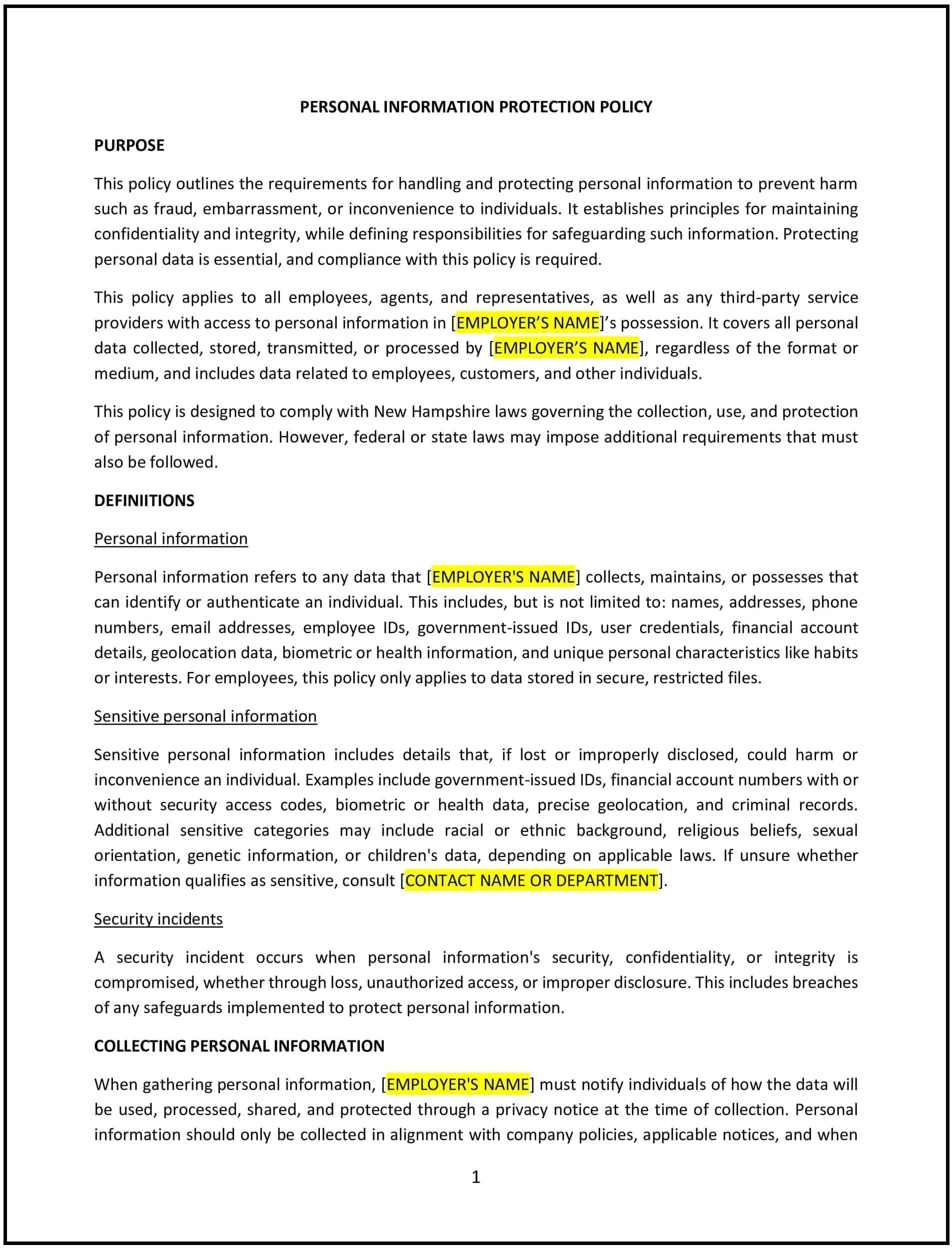Personal information protection policy (New Hampshire): Free template
Got contracts to review? While you're here for policies, let Cobrief make contract review effortless—start your free review now.

Customize this template for free
Personal information protection policy (New Hampshire)
A personal information protection policy helps New Hampshire businesses protect the personal data of employees, customers, and other stakeholders. This policy outlines the procedures for collecting, storing, using, and sharing personal information, ensuring that sensitive data is handled securely and in support with privacy laws.
By adopting this policy, businesses can safeguard personal data, build trust with customers and employees, and mitigate the risk of data breaches or misuse.
How to use this personal information protection policy (New Hampshire)
- Define personal information: Clearly define what constitutes personal information in the context of your business, including sensitive data such as Social Security numbers, contact information, financial details, and health records.
- Outline data collection procedures: Specify how personal information will be collected, including methods for obtaining consent from individuals when necessary. Be transparent about what information is collected and the purpose for which it will be used.
- Set data storage and access guidelines: Define how personal information will be securely stored, whether electronically or physically, and who will have access to this data. Implement strong access controls to limit exposure.
- Address data sharing and third-party relationships: Detail how personal information may be shared with third parties, such as service providers or contractors, and require that these third parties comply with the policy and maintain appropriate data protection measures.
- Establish retention and disposal practices: Set clear guidelines for how long personal data will be retained and how it will be securely disposed of when no longer needed.
- Implement data protection measures: Outline the technical, physical, and administrative measures that will be taken to protect personal data from unauthorized access, theft, or loss. This may include encryption, secure networks, and employee training on data security.
- Ensure legal compliance: Ensure the policy is aligned with relevant privacy laws and regulations, such as the New Hampshire Data Breach Notification Law and federal laws like the Health Insurance Portability and Accountability Act (HIPAA) or the General Data Protection Regulation (GDPR) if applicable.
- Review and update: Regularly review and update the policy to reflect changes in privacy laws, technology, or business practices.
Benefits of using this personal information protection policy (New Hampshire)
This policy provides several benefits for New Hampshire businesses:
- Protects sensitive data: The policy helps businesses ensure that personal information is securely handled and protected against unauthorized access or data breaches.
- Builds trust: By implementing clear data protection practices, businesses demonstrate their commitment to safeguarding the personal information of employees and customers, fostering trust and confidence.
- Mitigates legal risks: The policy helps businesses comply with privacy laws and reduces the risk of legal action or penalties related to data breaches or misuse of personal information.
- Improves data management: Establishing clear data handling procedures improves the organization’s ability to manage and control personal information, ensuring it is used only for legitimate purposes.
- Enhances company reputation: A strong commitment to personal information protection can enhance a business’s reputation as a trustworthy organization, making it more attractive to potential customers and employees.
Tips for using this personal information protection policy (New Hampshire)
- Communicate the policy clearly: Ensure that all employees are aware of the personal information protection policy and understand their role in safeguarding sensitive data.
- Train employees regularly: Provide regular training on data security best practices, including how to handle personal information and how to spot potential threats such as phishing attempts or unauthorized access.
- Monitor compliance: Regularly audit data protection practices and conduct reviews to ensure compliance with the policy and relevant laws.
- Implement strict access controls: Limit access to personal information to only those employees or third parties who need it to perform their duties, and ensure that access is logged and monitored.
- Take immediate action in case of a breach: Establish clear procedures for responding to data breaches, including notifying affected individuals and authorities in compliance with applicable laws.
- Keep the policy up to date: Regularly review and update the policy to address new threats, technologies, or regulatory changes, ensuring the company remains compliant and well-protected.